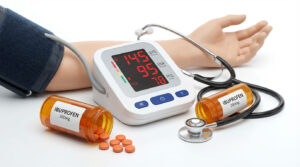A1C or Hemoglobin A1C is a test that is used to determine your average blood sugar levels for the last 3 months. It is particularly helpful for people who have prediabetes or Type 2 Diabetes.
For people who have diabetes, A1C is a great way for doctors to find out how you are managing your condition and if there are any risk factors.
The result of the A1C test comes in percentage. A high percentage on the A1C test indicates that your blood sugar levels (or blood glucose levels) have been on the rise. Getting a score lower than 5.7% indicates a normal A1C.1
But what happens when A1C is too high? There is not one but many risk factors and complications of high A1C. Heart disease, kidney disease, Metabolic Syndrome, eye disease, and elevated risk of suffering from a stroke are a few lethal examples. 2
What Is A High A1C?
Before we discuss in detail what happens when A1C is too high, it is essential to understand what high A1C is.
The A1C or Glycosylated Hemoglobin Test is also known by the following names—
- HbA1C Test
- Hemoglobin A1C Test
A high A1C score means that the person who underwent the test is at a higher risk of developing diabetes over time.
Here is an overview of what different scores on the A1C test mean—
- 5.7% – Normal blood sugar levels
- 5.7% to 6.4% – Indicates that a person is pre-diabetic
- 6.5% (or greater than this) – Indicates that a person is having type 2 diabetes
If your A1C score goes beyond 7%, it is considered to be high A1C.3 That is why it is essential to maintain your blood sugar levels in a way in which you can remain within the normal A1C range. To avoid the complications of high A1C levels, for most adults, it is recommended that the glycohemoglobin test remain under the range of 9%.4
The individual goals, however, may vary according to the personal aspects of an individual. These can include—
- Age of the patient
- The presence of any other disease or disorder 5
A1C Levels In People With Diabetes
As already mentioned before, generally, an A1C score that does not exceed 7% is recommended for most diabetics. It means that as long as your A1C score remains under 7%, your blood sugar is said to be under control. Getting a lower score also prevents you from the risk of high A1C levels, which could lead to more severe complications in the future.6
However, in the case of adults who have diabetes, the target score for A1C rises to a range that lies between 7% and 8%7. Remember that this is only an average value. What high A1C levels mean can be different for everyone. The ultimate target score can differ for every diabetes patient based on some important factors.
1. Factors That Affect The A1C Levels In Diabetics
Your doctor is going to set your ideal A1C levels based on the answers to the following questions—
- What is your age?
- What is the current status of your overall health?
- Whether you are pregnant or not?
- Since how long are you suffering from diabetes?
- What is your current treatment plan?
- Whether you have ever suffered from the adverse effects of your ongoing diabetes treatment?
- Whether you have had any episodes of extremely low blood glucose levels, medically referred to as hypoglycemia?
- Is there any diagnosed diabetes complication associated with your health?
- What are your personal preferences, priorities, and expectations from the treatment? 8
2. Aiming For A Score That Is Less Than 6.5%
It is generally recommended for people who come under the following categories 9—
- Anyone who has suffered from diabetes mellitus over a short duration in the past
- People who are expected to live a long life
- Young individuals
- Someone who is managing their diabetes efficiently by following proper lifestyle and dietary habits
- People with an overall good health status
3. Aiming For A Score That Lies Between 7.0% to 8.5%
A1C score of 7.0% – 8.5% is recommended in the following situations—
- If someone’s diabetes is not coming under control even after trying different kinds of medications
- Older individuals
- People with a short life expectancy
- Someone who has experienced several diabetes-related complications (or complications of high A1C levels)
- Somebody who has been suffering from diabetes for a long time
- If you have ever had severe hypoglycemia in the past
- People with any kind of chronic disease
- People who have suffered from the side effects of treatment before
4. What Happens When A1c Is Too High In People Who Have Diabetes?
The answer to what happens when A1C is too high can be terrifying for people who have constant high blood sugar levels or severe diabetes. That is because it comes with the added risk of developing serious long-term conditions because of high A1C levels.
Examples of such complications associated with hyperglycemia (complications of high A1C levels) include the following—
- Heart disease
- Dental disorders and infections
- Diabetic retinopathy
- Neuropathy (nerve damage)
- Kidney failure
- Diabetic nephropathy
- Feet problems
- Serious skin infections
- Ulcerations and, in some severe cases,
- Amputation (only happens in extreme cases)
- Problems related to joints and bones
For diabetic patients who don’t get the right treatment at the right time for high blood sugar levels or in the case when their blood glucose levels increase too much, certain emergency complications may occur.
Emergency complications of high A1C levels (hyperglycemia complications) include the following—
- Diabetic ketoacidosis
- Hyperosmolar hyperglycemic state10
All in all, what high A1C levels really mean is that the diabetic patient has an increased risk of developing serious life-threatening diseases ranging from heart disease to kidney failure and many others, including bone and joint pain and diabetic retinopathy.
So, now that we have an overview of what really happens when A1C is too high, let us have a thorough understanding of what high A1C levels mean and the risk factors that are associated with high A1C levels.
Complications Of High A1C Levels
According to several research studies, non-fatal complications were observed in older people (aged 60-80 years) who had an A1C score between the range of 6% to 9% 11.
Non-fatal complications (conditions in which a person may not necessarily die as an end result) of high A1C levels include—
- Acute metabolic syndrome
- Acute microvascular diseases
- Acute cardiovascular diseases
The research studies concluded that any complication of diabetes that might ultimately result in death happened because of the presence of any of the above-mentioned non-fatal causes.12
Here is an overview of the major side effects of high A1C levels—
1. Diabetic Retinopathy
Diabetic retinopathy is dangerous because it affects your vision and has almost zero early symptoms. The common symptoms that are observed later include—
- Vision loss
- Blindness 13
Serious vision problems that can happen as a result of diabetic retinopathy include—
- Vitreous haemorrhage
- Retinal detachment
- Glaucoma
- Blindness
Among these, blindness is one of the most disastrous complications of high A1C levels. When A1C is too high in people who are at a high risk of eye diseases, more than one of the above-mentioned conditions can be present at the same time. As a result, too many blood vessels start growing abnormally in the retina. Ultimately, this might lead to complete vision loss, that is, blindness.
Who is at a high risk of developing diabetic retinopathy?
- People who don’t have proper control over their blood sugar levels14
- Pregnant Women
- People who have been suffering from diabetes (Diabetes Mellitus Type 2 or Diabetes Mellitus Type 1) for a considerably long duration
- People who have cardiovascular problems like high blood pressure and high cholesterol.
- People who consume tobacco regularly
- Black People
- Hispanic People
- Native Americans
2. Diabetic Nephropathy
Commonly called diabetic kidney disease 15, diabetic nephropathy is another complication that many people with juvenile diabetes (Type 1 diabetes) and Type 2 diabetes suffer from.
Similar to diabetic retinopathy, diabetic nephropathy also does not show any obvious symptoms in the initial stage. However, the symptoms that occur in the later stages include 16—
- Blood pressure levels are so high that they cannot be controlled effectively.
- Visible swelling in your hands, eyes, feet, or ankles
- Urine that looks foamy
- Confusion
- Difficulty in thinking clearly
- Shortness of breath
- Nausea
- Vomiting
- Itching
- Tiredness
- Weakness
If not treated timely, diabetic nephropathy can convert into serious complications like 17—
- Pulmonary edema
- Anemia
- Hyperkalemia
- Pregnancy complications that can put both the mother as well as the baby at a high risk
- Cardiovascular diseases like heart disease, vascular conditions and stroke
- End-stage kidney disease (A condition that requires kidney transplant ultimately)
3. Cardiovascular Complications Of High A1C Levels
There are certain nerves and blood vessels which play a crucial role in controlling your heart. What happens when A1C is too high is that your blood vessels get severely damaged. That is because a high A1C score is indicative of high blood sugar levels.
As a result, your chances of becoming prey to several heart-related disorders increase. Examples of such cardiovascular problems include—
- Extremely high blood pressure levels that can lead to hypertension
- Too much accumulation of bad cholesterol, that is, low-density lipoprotein or LDL in your blood
- Fat accumulation in the blood
Whether it is LDL (bad cholesterol), HDL (good cholesterol), or fats, when these get accumulated, your arteries tend to harden. This hardening of your arteries ultimately has a negative impact on your cardiovascular system. It eventually leads to heart-related disorders.18
The risk of high A1C levels for your heart can increase in case of the following 19—
- People who are severely overweight or obese
- People who are not physically active
- People who consume alcohol and smoke on a regular basis
- People whose diet contains excess quantities of saturated and trans fats along with cholesterol and sodium.
People with diabetes must understand that they are at an elevated risk of suffering from heart failure. It is a condition in which your heart loses its ability to pump blood normally and as efficiently as before.
Apart from these, diabetic neuropathy and metabolic syndrome are two other crucial complications that people suffering from diabetes might come across.
Therefore, there is a long list of lab tests for diabetic patients (along with the A1C test) that might help you prevent the onset of these complications on time. At the same time, it is essential to speak to your doctor whenever you observe any of the above-mentioned symptoms for timely elimination of the risk of high A1C levels.
Reasons Your A1C Might Be High When You’re Not Diabetic
In the above sections, we have summarised what happens when A1C is too high in the case of diabetics. But what about people who do not have diabetes? In that case, your A1C levels (or simply blood sugar levels) might be high because of the following reasons—
- Diet: Consuming a diet that is high in carbohydrates too frequently directly causes an increase in your blood glucose levels. Examples of such food items include fried foods, processed foods, pasta, and white rice.20
- Poor Sleeping Patterns: Lack of sleep hampers your body’s ability to use the insulin that it is making to its most power. The result? High blood glucose levels.
- Stress: Stress has an indirect impact on your blood sugar levels. What taking too much stress does is that it increases your blood sugar to extreme levels. This happens even when you are not a diabetic. It is a good idea to control your stress levels by performing activities like exercise, yoga, and meditation.
Other prominent reasons for high A1C scores in non-diabetic people include—
- A temporary rise in blood glucose levels because of the intake of specific medicines such as steroids
- The presence of anaemia or any other medical condition or temporary sickness 21
To summarise, your body can experience a lot of negative effects if your A1C is too high. For diabetic patients, it is advised that you must take the A1C test a minimum of 2 times a year. Along with that, you are also advised to take an overall sugar profile test to determine your current condition and predict your future complications.
Sources
Ref Links:
- A1C
- How can people manage their A1C levels?
- A1C
- The Diabetes Control and Complications Trial
- All About Your A1C
- Understanding HbA1c: What Is It and Why Is It Important
- Understanding HbA1c: What Is It and Why Is It Important
- A1C chart and understanding A1C levels
- A1C chart and understanding A1C levels
- Hyperglycemia in diabetes








